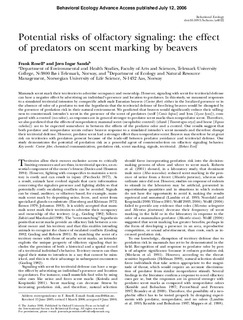| dc.contributor.author | Rosell, Frank | |
| dc.contributor.author | Sanda, Jørn Ingar | |
| dc.date.accessioned | 2008-04-01T13:00:14Z | |
| dc.date.accessioned | 2017-04-19T12:25:16Z | |
| dc.date.available | 2008-04-01T13:00:14Z | |
| dc.date.available | 2017-04-19T12:25:16Z | |
| dc.date.issued | 2006 | |
| dc.identifier.citation | Behavioral ecology 17(2006), No. 6, p. 897-904 | |
| dc.identifier.issn | 1465-7279 | |
| dc.identifier.uri | http://hdl.handle.net/11250/2438062 | |
| dc.description | This is a pre-copy-editing, author-produced PDF of an article accepted for publication in Behavioral ecology following peer review. The definitive publisher-authenticated version is available online at: http://dx.doi.org/10.1093/beheco/arl022 | |
| dc.description.abstract | Mammals scent mark their territories to advertise occupancy and ownership. However, signaling with scent for territorial defense can have a negative effect by advertising an individual’s presence and location to predators. In this study, we measured responses to a simulated territorial intrusion by conspecific adult male Eurasian beavers (Castor fiber) either in the localized presence or in the absence of odor of a predator to test the hypothesis that the territorial defense of free-living beavers would be disrupted by the presence of predation risk in their natural environment. We predicted that beavers would significantly reduce their willingness to countermark intruder’s scent in the presence of the scent of predators (wolf [Canis lupus] and lynx [Lynx lynx]), compared with a control (no odor), as responses are in general stronger to predator scent marks than nonpredator scent. Therefore, we also predicted that the effects of nonpredatory mammal scent (neophobic control) (eland [Taurotragus oryx] and horse [Equus cabalus]) are to be expected somewhere in between the effects of the predator odor and a control. Our results suggest that both predator and nonpredator scents reduce beavers response to a simulated intruder’s scent mounds and therefore disrupt their territorial defense. However, predator scent had a stronger effect than nonpredator scent. Beavers may therefore be at great risk on territories with predators present because of the trade-off between predator avoidance and territorial defense. Our study demonstrates the potential of predation risk as a powerful agent of counterselection on olfactory signaling behavior. | |
| dc.language.iso | eng | |
| dc.publisher | Oxford University Press | |
| dc.subject | Beavers | |
| dc.subject | Scent marking | |
| dc.subject | Chemical communication | |
| dc.subject | Signals | |
| dc.subject | Predation risk | |
| dc.subject | Territorial behavior | |
| dc.title | Potential risks of olfactory signaling : the effect of predators on scent marking by beavers | |
| dc.type | Journal article | |
| dc.type | Peer reviewed | |
| dc.subject.nsi | 485 | |
| dc.identifier.doi | http://dx.doi.org/10.1093/beheco/arl022 | |
